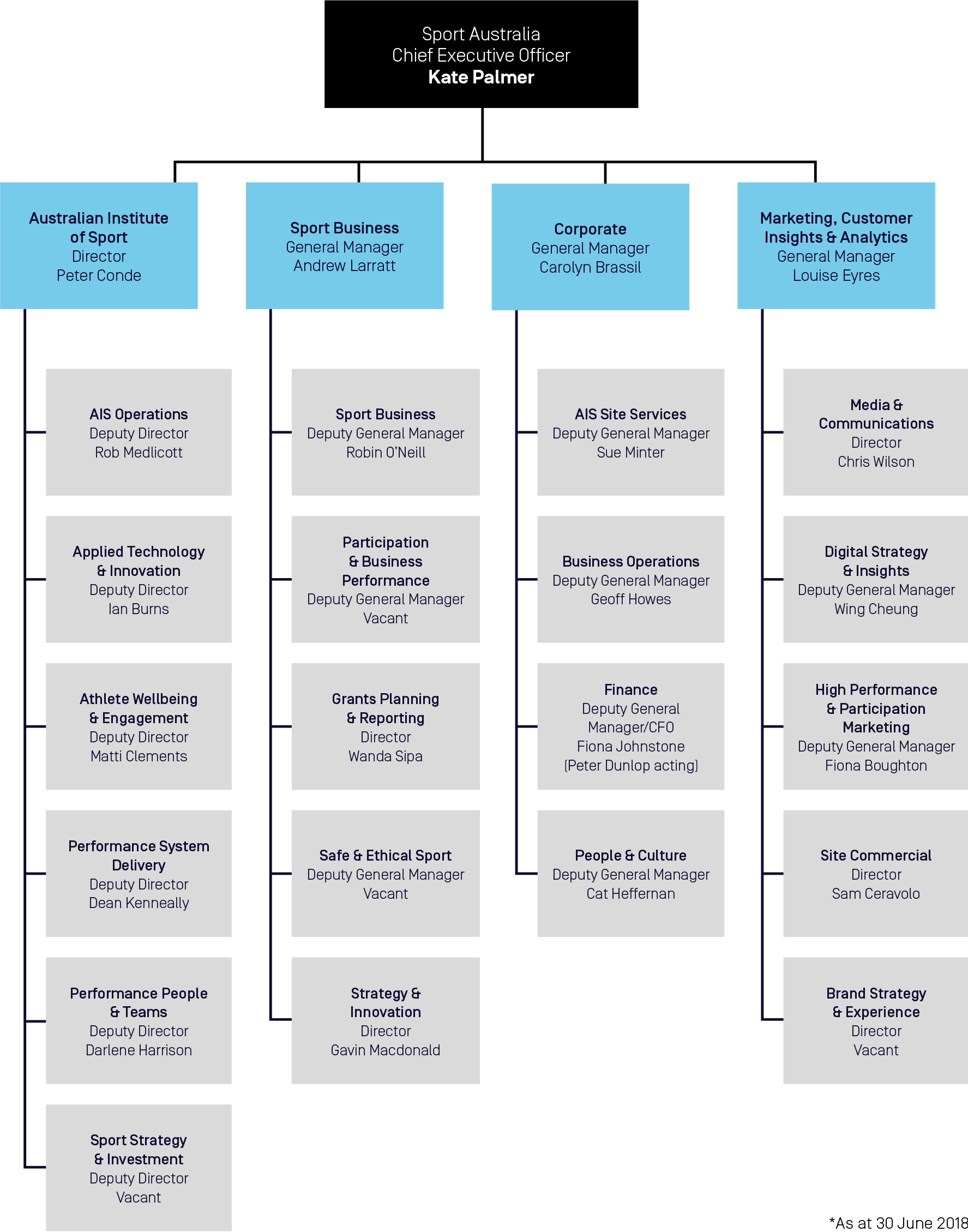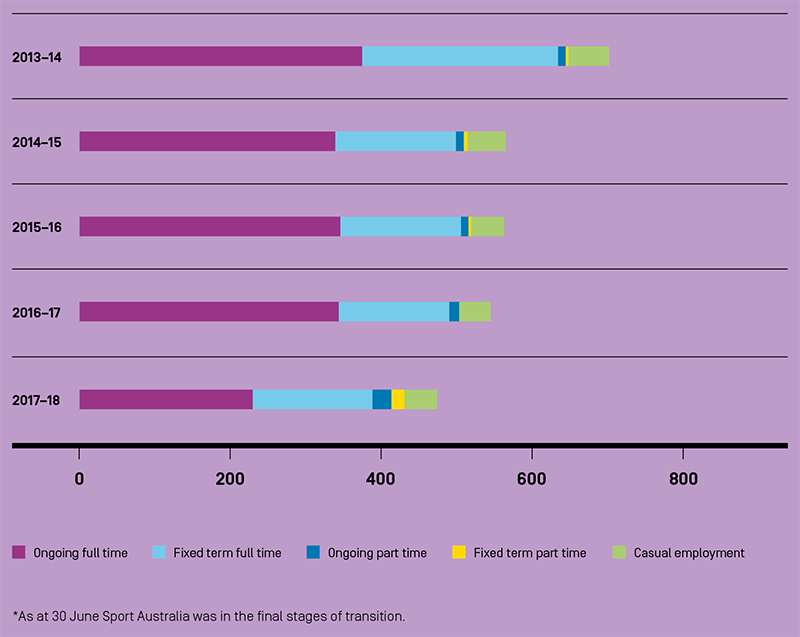Our history
Sport Australia, under the legal name of the Australian Sports Commission, is a corporate Commonwealth entity within the Australian Government’s Department of Health portfolio. It was established on 13 September 1984, when the then Prime Minister, the Honourable
Bob Hawke, and Minister for Sport, the Honourable John Brown, announced the membership of the Commission and its terms of reference. The ASC was formally established by the Australian Sports Commission Act 1989.
The Australian Government announced its decision in August 1987 to rationalise federal assistance to Australian sport. As a result, the AIS—first established as a public company under the Australian Capital Territory’s Companies Ordinance in 1981—was amalgamated with the ASC. The ASC subsequently became the principal Australian Government agency responsible for sport in accordance with the revised Australian Sports Commission Act 1989.
Our organisation
Sport Australia has staff and offices across Australia and is headquartered at the AIS campus in Bruce, Canberra, a 65-hectare multipurpose facility with sporting, administration, commercial and residential functions, as well as five regional offices and two high performance centres.
As a part of the review of its strategic direction, Sport Australia has redesigned its organisational structure and the capabilities required to position itself to deliver on its revised strategy and purpose. Effective from January 2018, Sport Australia has four divisions which are aligned to our strategic direction. As required under the ASC Enterprise Agreement, staff were consulted around the strategy and structure, and regular meetings were held with unions regarding the transition. An internal recruitment process was implemented for staff affected by the restructure, with external recruitment used to complement the internal process.
Organisational structure*

- Australian Sports Commission - Chief Executive officer Kate Palmer
- Australian Institute of Sport - Director (AIS) Peter Conde
- AIS Operations - Deputy Director Rob Medlicott
- Applied Technology and Innovation - Deputy Director Ian Burns
- Athlete Wellbeing and Engagement - Deputy Director Matti Clements
- Performance System Delivery - Deputy Director Dean Kenneally
- Performance People and Teams - Deputy Director Darlene Harrison
- Sport Strategy and Investment - Deputy Director (vacant)
- Sport Business - General Manager Andrew Larratt
- Sport Business - Deputy General Manager Robin O'Neill
- Participation and Business Performance - Deputy General Manager (vacant0
- Grants Planning and Reporting - Director Wanda Sipa
- Safe and Ethical Sport - Deputy General Manager (vacant)
- Strategy and Innovation - Director Gavin Macdonald
- Corporate Operations - General Manager Carolyn Brassil
- AIS Site Services - Deputy General Manager Sue Minter
- Business Operations - Deputy General Manager Geoff Howes
- Finance - Deputy General Manager/CFO - Fiona Johnstone (Peter Dunlop acting)
- People & Culture - Deputy General Manager - Cat Heffernan
- Marketing, Customer Insights and Analytics - General Manager Louise Eyres
- Media & Communications - Director Chris Wilson
- Digital Strategy & Insights - Deputy General Manager Wing Cheung
- High Performance & Participation Marketing - Deputy General Manager Fiona Boughton
- Site Commercial - Director Sam Ceravolo
- Brand Strategy & Experience - Director (vacant)
- Australian Institute of Sport - Director (AIS) Peter Conde
* as at 30 June 2018
Our people
Sport Australia has a highly capable and diverse workforce. As at 30 June 2018, Sport Australia was in the final stages of transition and there were 475 full time equivalent staff and Board members employed on an ongoing, non-ongoing and casual basis.
The ASC Enterprise Agreement 2016–2019 came into effect on 19 February 2016 with a nominal expiry date of February 2019. The Agreement provides Sport Australia staff with competitive remuneration and employment conditions. Sport Australia also offers staff a number of additional benefits not included under the Enterprise Agreement, including:
- annual influenza immunisations
- free skin cancer checks provided by Spotscreen
- a free, confidential employee assistance program for employees and their immediate families
- access to flexible working arrangements
- free onsite car parking (Canberra)
- priority access to the on-site childcare centre (Canberra)
- access to the on-site gymnasium and aquatic centre (Canberra).
Employees may also make use of a range of salary sacrifice benefits, including additional superannuation, leased motor vehicles and child care.
Table 8: Employees by classification*
Classification | Female (%) | Male (%) |
|---|---|---|
Executive | 60 | 40 |
ASC 8 | 54 | 46 |
ASC 7 | 28 | 72 |
ASC 6 | 34 | 66 |
ASC 5 | 50 | 50 |
ASC 4 | 49 | 51 |
ASC 3 | 53 | 47 |
ASC 2 | 48 | 52 |
ASC 1 | 59 | 41 |
Childcare workers | 93 | 7 |
Total | 52 | 48 |
*Excludes Board members, casuals and post graduate scholars
Sport Australia staff

| 2013/14 | 2014/15 | 2015/16 | 2016/17 | 2017/18** | |
| FTE* | FTE | FTE | FTE | FTE | |
| Ongoing Full Time | 374.40 | 338.40 | 345.43 | 342.79 | 229.00 |
| Fixed Term Full Time | 258.00 | 159.30 | 157.50 | 146.50 | 161.00 |
| Ongoing Part Time | 11.20 | 11.20 | 11.68 | 11.65 | 25.00 |
| Fixed Term Part Time | 2.10 | 4.20 | 3.00 | 1.91 | 14.00 |
| Casual Employment | 54.10 | 49.80 | 43.36 | 41.75 | 45.00 |
| Total | 699.80 | 562.90 | 560.97 | 544.60 | 474.00 |
* Full-time equivalent. **As at 30 June Sport Australia was in the final stages of transition.
Under 30 | 18% |
|---|---|
30–39 | 37% |
40–49 | 23% |
50–59 | 17% |
60+ | 4% |
0–6 months | 8% |
|---|---|
7–12 months | 5% |
1–2 years | 10% |
2–5 years | 34% |
5–10 years | 19% |
10–15 years | 15% |
15+ years | 9% |
Totals may not add to 100% due to rounding
Sport Australia is continually working to ensure that athletes, staff and others in our care have appropriate protection and support. Following the release of the reports of the Royal Commission into Institutional Responses to Child Sexual Abuse, Sport Australia engaged the Australian Childhood Foundation to undertake an independent review of Sport Australia’s current operations and services against child safe standards. The report from that review, due to be finalised early in 2018–19, will guide Sport Australia’s work to ensure that we have a safe and supportive environment now and into the future.
In April 2018, Sport Australia published its ‘Responding to Sexual Misconduct’ policy. This policy builds on current protocols and procedures, including our Code of Conduct, and ensures Sport Australia has a framework in place—supported by specialist external service providers—to respond to incidents of sexual misconduct while under Sport Australia’s care and provide the appropriate support to those involved.
From 1 July 2018, Sport Australia will be a participating institution for the purpose of the National Redress Scheme.
Work health and safety
The Sport Australia Work Health and Safety (WHS) Policy outlines our commitment to providing a safe and healthy workplace for staff and visitors and our approach to continuous improvement of health and safety. The WHS Policy and operations are overseen by the Sport Australia Work Health and Safety Governance Forum and the WorkSafe Committee.
The WHS Governance Forum provides leadership and strategic oversight of workplace health and safety management systems and employee rehabilitation. The forum is responsible for ensuring compliance and overseeing performance reporting, including periodic reporting to the Sport Australia Executive and the Finance, Audit and Risk Committee.
The WorkSafe Committee is an operationally focused consultative forum which comprises employee Health and Safety Representatives (HSRs) and senior management. The committee meets regularly and three HSRs from the committee are also members of the WHS Governance Forum.
Key initiatives during 2017–18 included:
- continued refinement of the WHS and rehabilitation management systems performance reporting
- continuation of the early intervention scheme which had a positive impact on the Comcare premium
- focus on psychological and wellbeing training
- provision of education and training on first aid, fire warden, emergency response accompanied by emergency exercises
- completion of the annual program of WHS-related training and workplace hazard inspections.
Notifiable incidents
A total of four incidents arising from the conduct of Sport Australia business were reported during 2017–18. There was one investigation undertaken in 2017–18 under Part 10 of the Work Health and Safety Act 2011. It was determined that Sport Australia had ensured as far as reasonably practicable, the health and safety of workers and others and no further action was required.